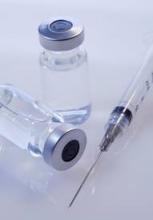Quadrivalent human papillomavirus vaccine may not protect a significant percentage of women against squamous intraepithelial lesions and other cervical dysplasias, according to a study published in the Journal of Clinical Oncology.
The Canadian researchers linked vaccination and cervical screening databases, among others, from the province of Manitoba to compare the incidence of cervical dysplasia in 3,541 women at least 15 years old when they were vaccinated with 9,594 aged-matched women who were not vaccinated. About 87% of the vaccinated subjects had more than one shot recorded in the three-shot series.
Among those women vaccinated between 15 and 17 years of age and followed for a median of 3.1 years, adjusted vaccine effectiveness (VE) was a nonstatistically significant 35% against high-grade squamous intraepithelial lesions (HSILs) and 21% against low-grade squamous intraepithelial lesions (LSILs). No protective effect was found (VE –1%) against atypical squamous cells of undetermined significance (ASCUS) (J. Clin. Oncol. 2014 Jan. 6 [doi: 10.1200/JCO.2013.52.4645]).
Among women 18 years or older with normal cervical cytology when vaccinated, the team estimated VE at a nonsignificant 23% against HSILs, and found no protective effect against LSILs (VE 18 %) or ASCUS (VE 20%). They found no evidence of protection among women with abnormal cervical cytology before immunization (VE 8%).
Both immunized and nonimmunized women had a cumulative 3-year probability of 2.8% for ASCUS. The vaccinated group had a cumulative 3-year probability of 3.3% for LSILs and 2.3% for HSILs; the unvaccinated group had a cumulative 3-year probability of 3.7% for LSILs and 2.6% for HSILs. Carcinoma-in-situ was detected in 12 vaccinated females (0.3%) and 22 unvaccinated females (0.2%).
"These findings affirm the importance of vaccinating females at a young age before any significant exposure to HPV occurs and underscores the need for maintaining organized high-quality screening programs that cover all sexually active women, even if they were vaccinated," concluded Dr. Salaheddin M. Mahmud of the University of Manitoba, Winnipeg, and his associates.
Although in preapproval trials, the "vaccine was shown to be greater than 90% effective against HPV 16/18-associated dysplasia, VE in practice is likely much lower because these types are only responsible for approximately half of HSILs and a quarter of LSILs. Moreover, these high VE estimates were only observed in per-protocol analyses that were typically limited to HPV-naive women who received all three doses. In the intention-to-treat analyses, which were closer in design to our analysis, efficacy estimates were much lower, especially against HPV16-associated dysplasia. Efficacy was also lower among older women and among women with abnormal baseline Pap cytology; in one trial, VE was a mere 18.7% in the latter group," they said.
Vaccinated women in the study were more likely to have Pap smears, leading to a possible detection bias; VE was a bit higher when the analysis was limited to women in both groups who had at least one Pap smear after enrollment.
The researchers added that "vaccinated women were also more likely to have been screened before enrollment, [which] may reflect increased concern ... about the risk of sexually transmitted infections."
The work was funded in part by the government of Manitoba. Dr. Mahmud reported receiving research funding from GlaxoSmithKline, Sanofi-Aventis, and Pfizer. Another author, Erich V. Kliewer, is a paid adviser to GlaxoSmithKline and to Merck, maker of the vaccine. A third author, Alain A. Demers, reported other remunerations from Merck.


